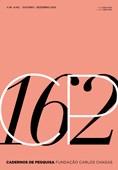The aesthetic expe rience in times of tec hnological virtualization
Keywords:
Education, Technology, Experience, Aesthetics.Abstract
This essay attempts to problematize the meaning of art and technologies in the educational rationale, based on the elements of the critical aesthetic theory of Theodor Adorno. For this, we raise the following issues: Does it still make sense to think about the formative experience of art within the digital age? Is it possible to demystify the technologies of education through the aesthetic reconstruction of meanings? How can we consider the expressive dimension of education within the scope of instrumentality? Through a hermeneutic study, we seek to understand and rethink technologies, discussing a critical mediation of the universe of art in education, as a reflexive gesture, a dialogical and emancipatory exchange, at the same time made possible and yet hindered by the opposing and intense relationships of today.Downloads
References
ADORNO, Theodor. Teoria estética. Tradução de Artur Mourão. 1. ed. Lisboa: Edições 70, 1992a.
ADORNO, Theodor. Anotações sobre teoria e prática. In: RAMOS-DE-OLIVEIRA, N. Quatro textos clássicos. Tradução de Newton Ramos-de-Oliveira. São Carlos: UFSCar, 1992b.
Publicação interna.
ADORNO, Theodor. Minima moralia: reflexões a partir da vida danificada. Tradução de Artur Morão. Lisboa: Edições 70, 1993.
ADORNO, Theodor. Educação e emancipação. Rio de Janeiro: Paz e Terra, 1995.
ADORNO, Theodor. O fetichismo na música e a regressão na audição. In: ADORNO, Theodor. Textos escolhidos. São Paulo: Nova cultural, 1996. p. 65-108.
ADORNO, Theodor. Dialética negativa. Tradução de Marco Antonio Casanova. Rio de Janeiro: Jorge Zahar, 2009.
BARBOSA, Ricardo C. Dialética da reconciliação: estudo sobre Habermas e Adorno. Rio de Janeiro: Uapê, 1996.
BENJAMIN, Walter. A obra de arte no tempo de suas técnicas de reprodução. In: BENJAMIN, Walter; ADORNO, Theodor; GOLDMAN, Lucien. Sociologia da arte. Rio de Janeiro: Zahar, 1969. v. 4. BENJAMIN, Walter. Experiência e pobreza. In: BENJAMIN, Walter. Magia e técnica, arte e política: ensaios sobre literatura e história da cultura. 7. ed. São Paulo: Brasiliense, 1994. p. 114-119.
GADAMER, Hans-Georg. Elogio de la teoría: discursos y artículos. Tradução de Anna Poca Casanova. Barcelona: Península, 1993.
GOERGEN, Pedro L. A crítica da modernidade e a educação. Pro-posições, Campinas, v. 7, n. 2, p. 5-28, jul. 1996.
HABERMAS, Jürgen. Modernidade: um projeto inacabado. In: ARANTES, O.; ARANTES, P. Um ponto cego no projeto moderno de Jürgen Habermas. São Paulo: Brasiliense, 1992.
JAEGER, Werner. Paidéia: a formação do homem grego. 3. ed. São Paulo: Martins Fontes, 1995.
MARTINI, Rosa Maria F. Reencantar a ação educativa, um empreendimento possível? Reflexão e Ação, Santa Cruz do Sul, v. 13, n. 2, p. 15-21, jul./dez. 2005.
TIBURI, Márcia. Metamorfose do conceito: ética e dialética negativa em Theodor Adorno. Porto Alegre: Editora da UFRGS, 2005.
TREVISAN, Amarildo Luiz. Filosofia da educação: mímesis e razão comunicativa. Ijuí, Editora da Unijuí, 2000.
Downloads
Published
How to Cite
Issue
Section
License
Copyright (c) 2016 Cadernos de Pesquisa

This work is licensed under a Creative Commons Attribution-NonCommercial 4.0 International License.
Authors who publish in this journal agree to the following terms:
a. Authors retain the copyright and grant the journal the right to first publication, with the paper simultaneously licensed under the Creative Commons Attribution license that allows the sharing of the paper with acknowledgment of authorship and initial publication in this journal.
b. Authors are authorized to assume additional contracts separately, for non-exclusive distribution of the version of the paper published in this journal (for example publishing in institutional repository or as a book chapter), with acknowledgment of authorship and initial publication in this journal.
c. Authors are allowed and encouraged to publish and distribute their paper on-line (for example in institutional repositories or on their personal page) at any moment before or during the editorial process, as this can generate productive changes, as well as increase the impact and citation of the published paper (See The Effect of Open Access).









